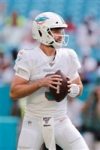Betting handles on NFL draft up significantly from 2017, sportsbooks say

“I thought there was no way a team with a 37-year-old quarterback (Eli Manning) would be dumb enough to draft a running back,” Ed Salmons, the Westgate Las Vegas Superbook’s head football oddsmaker, told ESPN. “I don’t understand why these guys do what they do. I guess that’s why they get fired all the time.”
All 256 picks are in. Full coverage »
• Kiper: Draft grades for every team »
• McShay: Every team’s best pick »
• Nation: Top post-draft questions to follow »
• Nation: Breaking down picks by team »
• Graziano: Biggest post-draft stories »
• Trade tracker: Every move, by team »
• McShay: Top undrafted prospects »
• Barnwell: Who aced Round 1 trades »
• New digits: Picks get jersey numbers »
•Kiper’s winners: Day 1 » | 2 »
•McShay’s awards: Day 1 » | 2 »
• Nation: Pros, cons for first 32 picks »
Josh Rosen opened as a minus-300 favorite to be drafted ahead of Barkley, and the UCLA quarterback closed as a plus-270 underdog. That head-to-head draft proposition was one of a few props that contributed to a net loss for both the Westgate and William Hill sportsbooks after Round 1.
“Obviously styles make fights. This one had all the quarterbacks and that’s why it was so interesting to everyone,” William Hill director of trading Nick Bogdanovich, who said there was an 800 percent increase in betting handle at his sportsbook from last year, told ESPN.
Nevada Gaming allowed draft betting for just the second year, as it continues to expand its policy of only approving outcomes solely decided on the field of play. MVP and other similar voting options have gradually been added to the betting menu in recent years.
“You basically need a lawyer to submit these things to explain how you’re going to do it,” Salmons said. “We don’t have the manpower or time to petition, so we just look at the gaming website and play by the rules.”
For example, Nevada sportsbooks only can offer binary draft propositions: head-to-head matchups of two particular players; an over/under for the total number of players drafted from a particular school or a conference; or by position in the first round.
“Next year, we will probably do fewer unless things are opened up for us,” Salmons said, who cited a 350 percent betting handle increase at his sportsbook.
Nevada sportsbooks could not offer long shot odds for a large group of players to be chosen with the top overall pick. Specifically, offshore markets offered 10-to-1 odds on Mayfield but that also allows a sportsbook to offset that high payout with all the losing tickets for every other player and still guarantee a hold percentage.
The other proposition bets that sealed a financial loser in Nevada were over 1.5 running backs drafted in the first round; three were taken. Also, Washington’s Vita Vea was selected ahead of Marcus Davenport of UT-San Antonio, as the betting steam suggested.
“It’s not like booking an NBA playoff game. The true odds could be minus-500 or minus-5000. This stuff is inexact,” Bogdanovich said.
As for significant line movement, Louisville’s Lamar Jackson opened as a minus-110 favorite at the Westgate over fellow quarterback Mason Rudolph of Oklahoma State and closed at minus-900. Only the 2016 Heisman Trophy winner was taken in the first round.
Plus, sportsbooks could not weather the storm of the prop bet of 1.5 Notre Dame players drafted in the first round. The Westgate opened the over at minus-240 and closed it at minus-1600. Two Irish players — Quenton Nelson and Mike McGlinchey — were taken within the first nine picks.
“We tried to look at eight mock drafts of guys we trust,” Salmons said of posting the betting lines 11 days in advance of draft night. “It’s hard to do your everyday job and then also read up on draft stuff when you have a certain group of bettors that are tracking this nonstop.”
Time will ultimately tell how each team fared. However, we do know for sure Las Vegas lost on this particular draft night.